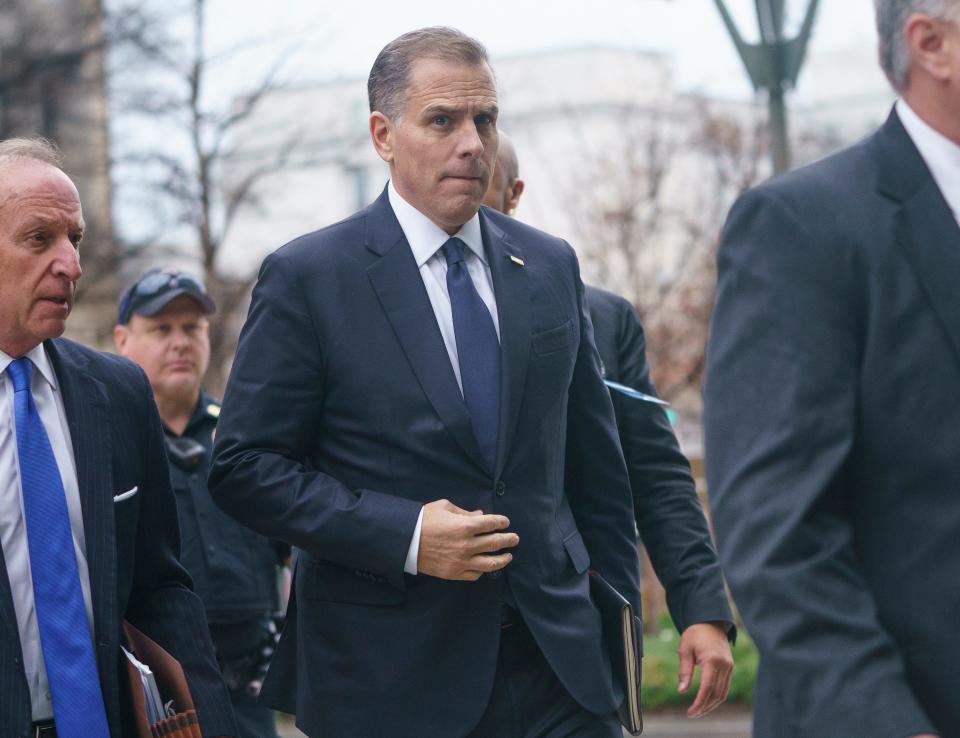Federal appeals court rejects dismissal request in Hunter Biden's gun case. Trial starts June 3
A federal appeals court on Thursday rejected Hunter Biden’s request to dismiss his gun charges in Delaware, clearing the way for a June trial.
Biden's lawyer, Abbe Lowell, said he would keep fighting to dismiss the case. “In reviewing the panel’s decision, we believe the issues involved are too important and further review of our request is appropriate,” Lowell said in a statement.
U.S. District Judge Maryellen Noreika had refused to dismiss the charges against Biden, who allegedly lied about an addiction to drugs when buying a gun in 2018.
Biden then appealed with three arguments, including that he shouldn’t face a trial after a plea agreement fell apart last July and that prosecutors are being vindictive because of political pressure from Republicans to prosecute the president’s son.

But a three-judge panel of the 3rd U.S. Circuit Court of Appeals rejected his three arguments unanimously because the case hasn’t reached a final judgment yet.
“Criminal defendants raising those challenges cannot appeal before final judgment,” Judges Patty Schwartz, Cindy Chung and Brooks Smith ruled.
The appeals judges ruled that nonprosecution agreements, such as the one that was abandoned for Biden’s gun charges, don’t prevent being charged in the future.
Biden also asked the appeals court for special consideration under a policy for “extreme” and “extraordinary” cases with a likelihood of irreparable injury. But the judges ruled his case didn’t meet that standard.
Trial is scheduled to start June 3. Noreika set a May 17 deadline for proposed jury questions and instructions, and a final pretrial conference on May 24.
What is Hunter Biden charged with?
The indictment charges Biden with knowingly deceiving a firearms dealer by buying a Colt Cobra 38SPL revolver on Oct. 12, 2018. He is charged with falsely filling out a federal form denying he was addicted to any narcotics. And he is charged with knowingly possessing the revolver despite the restrictions against people addicted to drugs owning firearms.
Biden has acknowledged he was a drug addict at the time.
He faces a maximum sentence of 25 years in prison if convicted ? five years for the false statement to the dealer, 10 years for the false statement on the federal form and 10 years for possession of the firearm ? but actual sentences typically are shorter than the maximum, according to the Justice Department.
The plea agreement would have allowed Biden to plead guilty to two misdemeanors for failing to pay his taxes in 2017 and 2018, and to enter a pretrial program for a gun charge that could have been dismissed if he complied. The deal might have allowed him to avoid prison.
David Weiss, the U.S. attorney for Delaware, investigated Biden for five years and reached a plea agreement last July. But Republican lawmakers criticized the agreement, which could have carried no jail time, as a "sweetheart deal."
Noreika rejected the plea agreement because of disputes between prosecutors and defense lawyers about whether Biden could face other charges.
Attorney General Merrick Garland then appointed Weiss as special counsel to continue his investigation. Weiss secured indictments in Delaware on gun charges and in California on tax charges. Biden has also appealed to dismiss the tax charges.
This article originally appeared on USA TODAY: Federal appeals court refuses to dismiss Hunter Biden's gun charges
